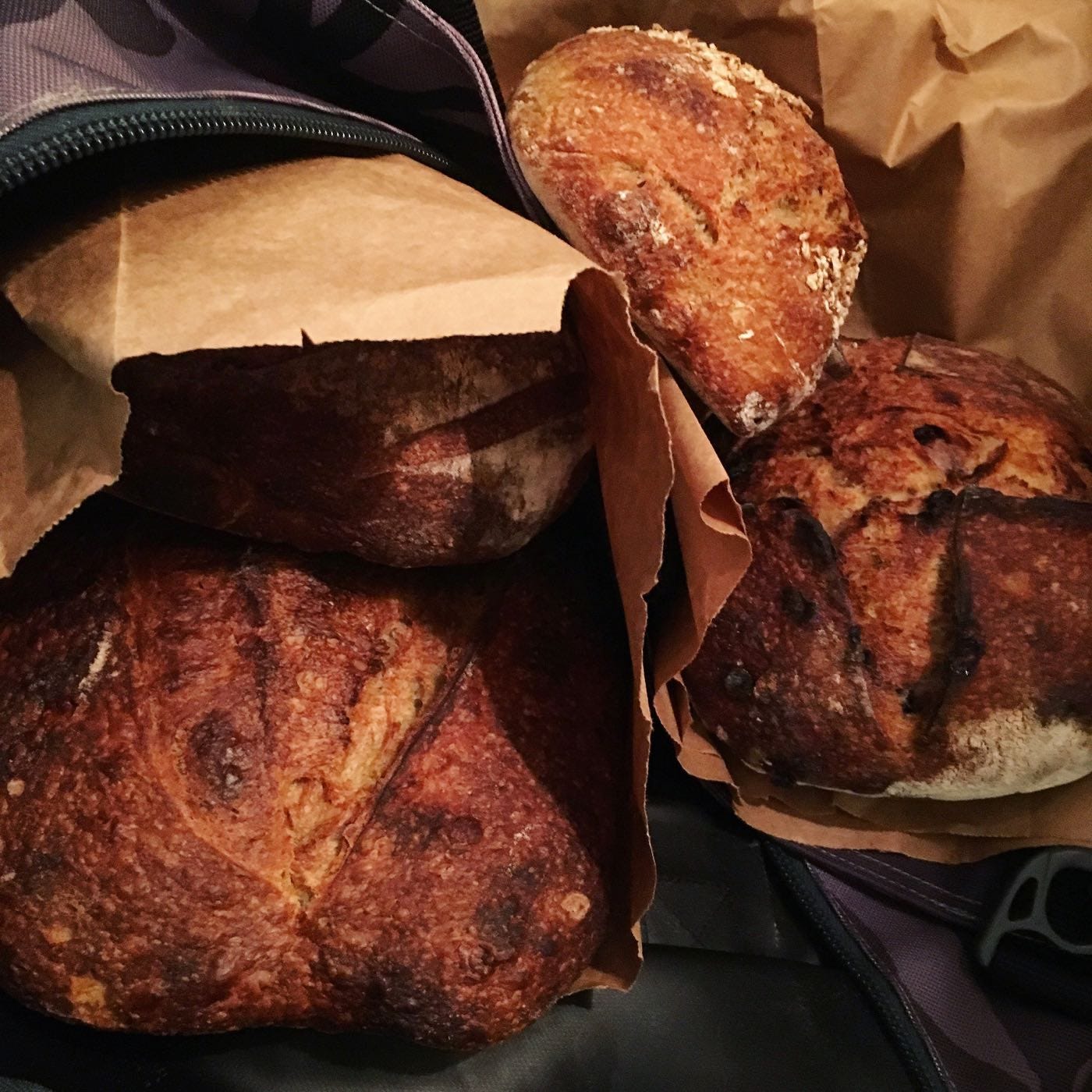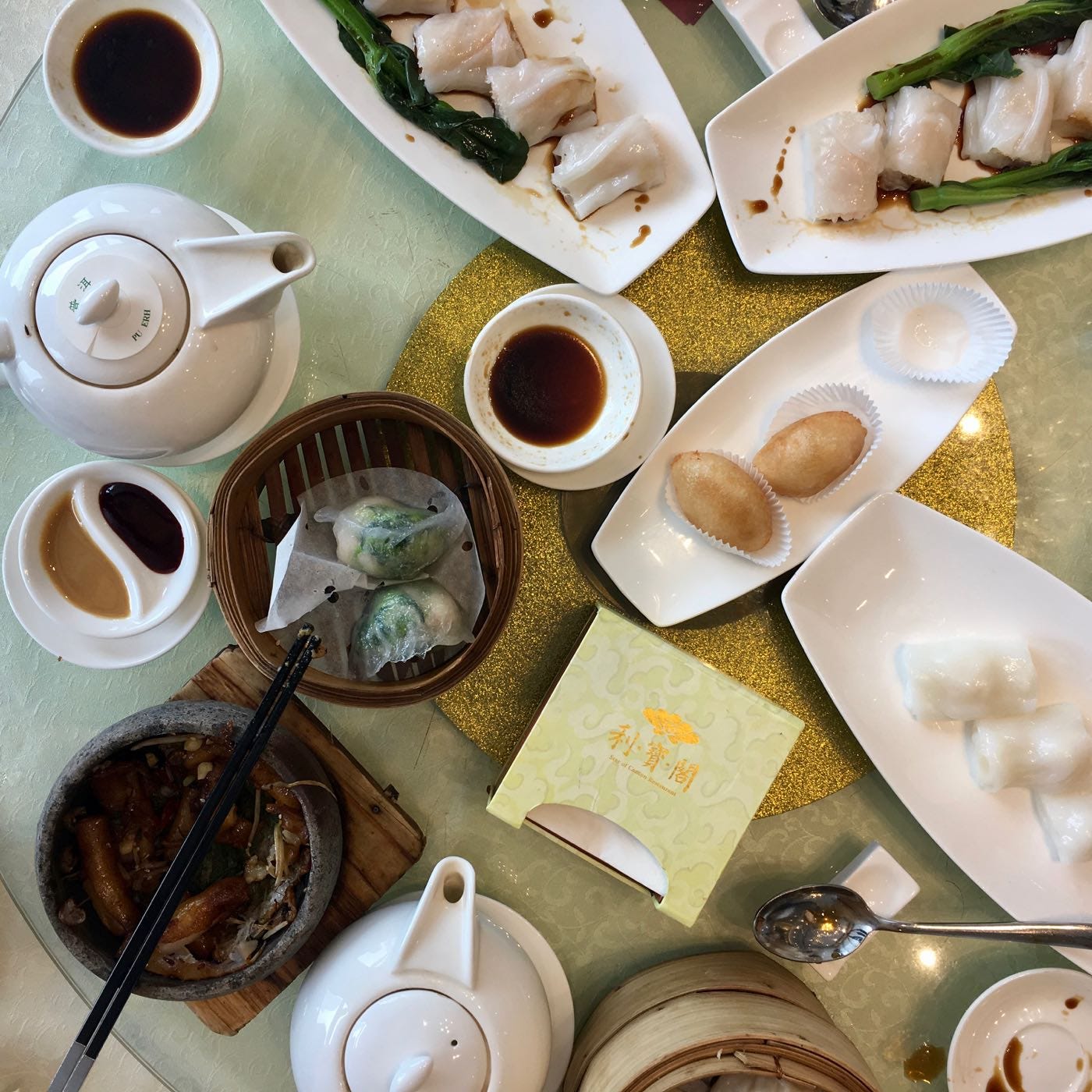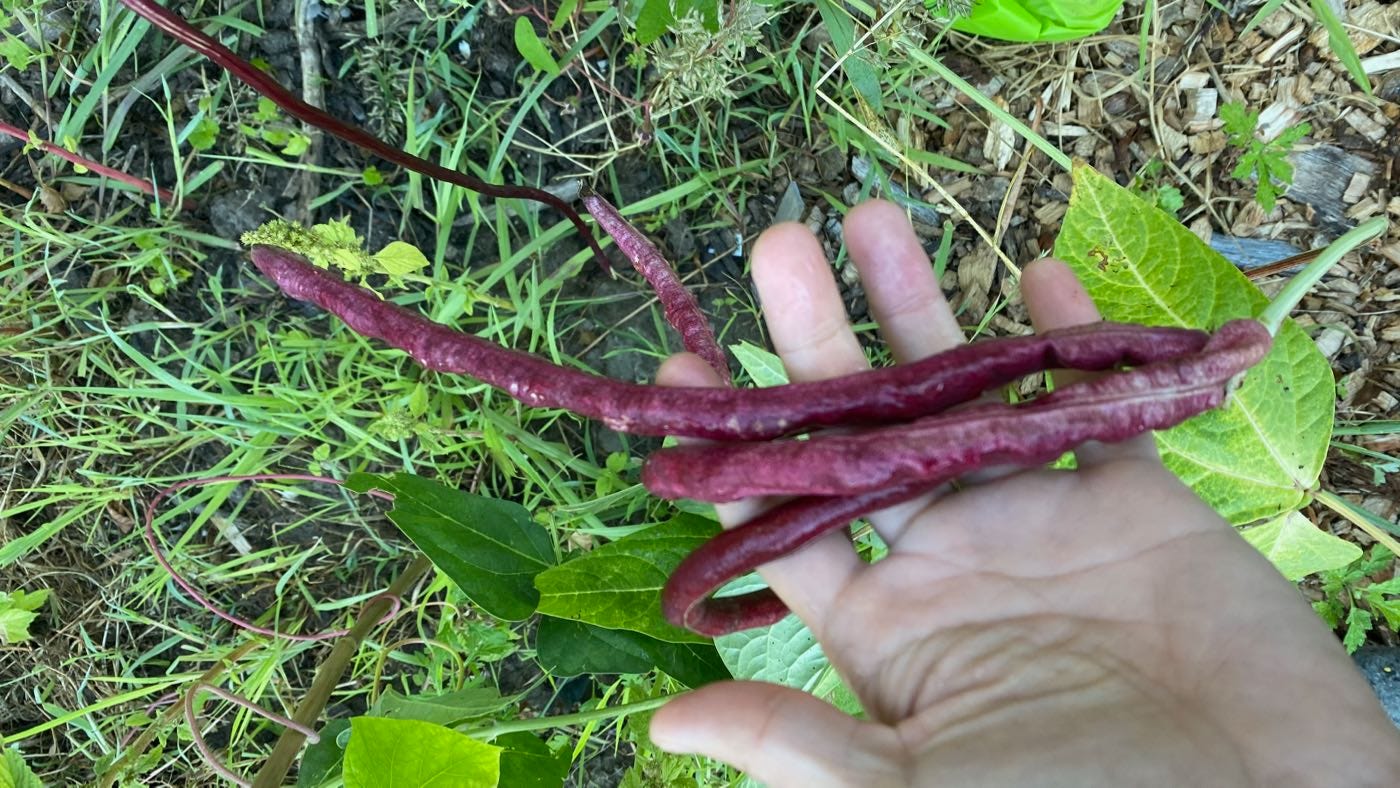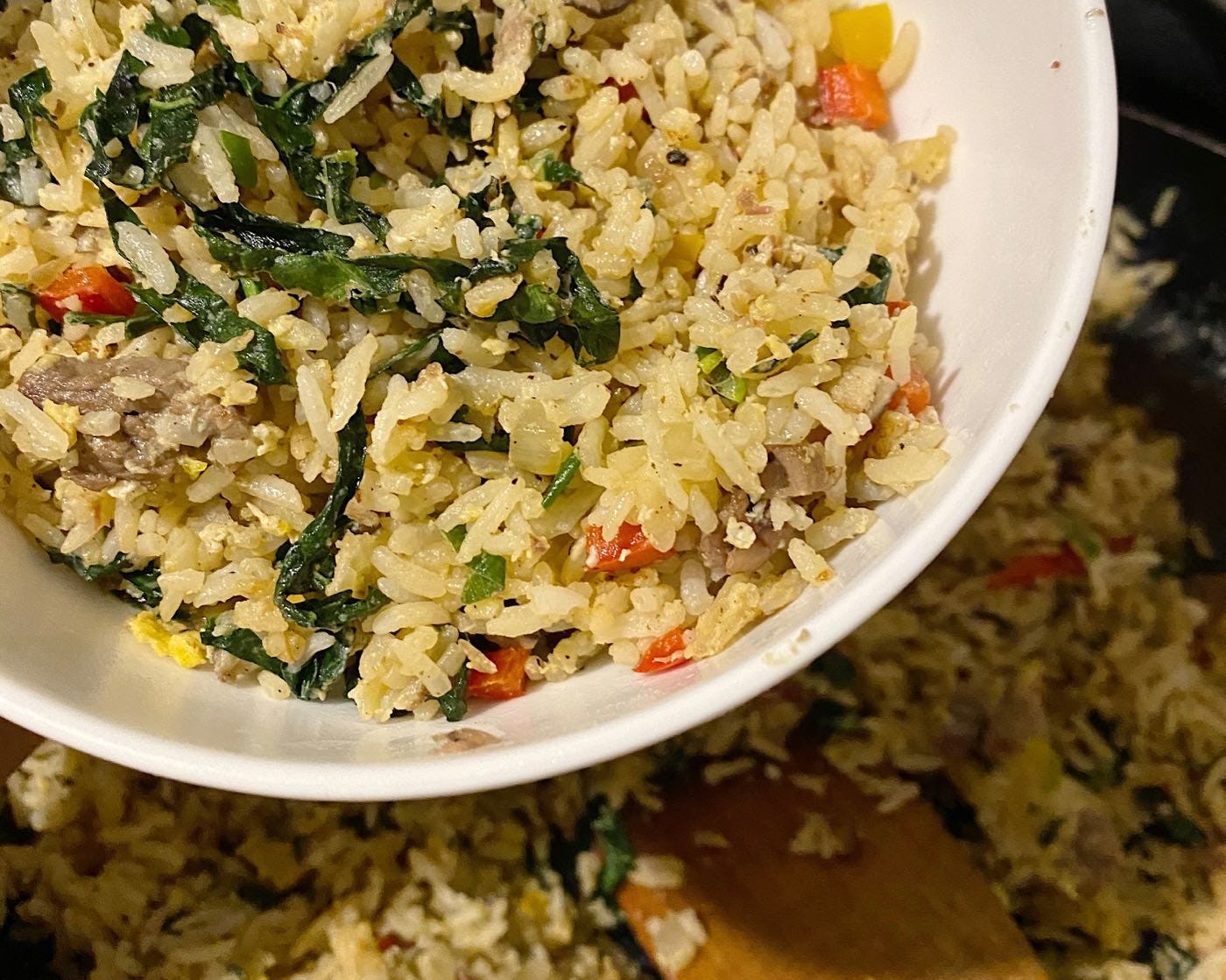The Joy of Eating
Some fragmented thoughts on food, memory, long beans, brisket fried rice, and my tragically bad taste in music
The 92nd Day after Coronatide*
Grand Rapids, Michigan
Hello, friends.
I’ve been thinking a lot about food this week. Who am I kidding? I think a lot about food every week.
Tristan and I were dreaming the other day about where we might go when we’re finally able to travel, which means we were dreaming about what we might eat, because food is typically a focal point of our journeys. He said he might like to revisit Montreal, one of our favorite food cities. (I wrote about Montreal’s culinary scene for Travel+Leisure last year.) I said that I miss dim sum; I can make egg rolls, wonton, and potstickers, but I don’t have the skills to make the delicate dumpling pastry that houses fragrant clumps of chive or the fragile rice noodles that envelop plump prawns or you tiao, the crispy fried dough that also traditionally provides the crunchy counterpoint to congee.

My carry-on last time I returned from Montreal was full of bread from the bakery Automne
There are some people who put food in their mouths simply so that they won’t die. Others among us find great delight in food. But maybe it’s not either/or. Maybe the emotional enjoyment of eating can offer more than just good feeling. There might be a layer of luxury in a food that you might consider a guilty pleasure, but maybe the pleasure doesn’t have to be guilty, because it helps to sustain you for the fight.
Food connects us to our heritage and to our ancestors. I’m so craving dim sum—and all manner of Chinese food that I can’t cook—because it restores me not just in body but also in spirit. It carries the strength of my ancestors’ stories and reminds me of the resilience of their souls. It returns me to Hong Kong, to the abundance of little dishes spinning on a lazy Susan, to endless cups of tea and rounds of the raucous and rapid-fire wordplay that marks Cantonese conversation. (But why are my people so loud?)

The table during dim sum with extended family in Hong Kong. This is what I miss so much.
Whenever I make fried rice, I think of my paternal grandmother, whose life was indelibly marked by war and violence, colonization and migration, both forced and chosen. Her wok, which traveled across the Pacific with her from Hong Kong, produced countless bowls of fried rice when I was a kid. She died when I was 17, and lately, I’ve especially missed her presence and her nightly, bipartisan prayers for political repentance. So when I make my own fried rice, I always think of her faithfulness, of interminable Baptist pre-meal blessings, of the green onions she grew on her balcony, of the crunchy bits harvested from the bottom of the wok, of her.
Food also grounds us in the truths and delights of the past, which can help feed our faith and hope for the future. Memory matters, which is why I think Christians are called back to the communion table week after week, to partake of the bread and the wine in remembrance of the one who loved us and loves us still. Joy matters, and the rekindled memory of bygone joys can sustain us through periods of present struggle.
Tristan has been such a stalwart support in these wild months of COVID-19—as I’ve struggled to learn how to serve a congregation well, as I’ve struggled to cobble together a living, as I’ve struggled to write. We rarely leave our house except to go for walks with Fozzie, and we haven’t been able to take the trips we imagined we would when we first moved to Michigan. We think this is the longest stretch Tristan has been away from Texas since he left for grad school. So I surprised him by ordering a brisket from Black’s, a venerable smoker in Lockhart, Texas—a taste of home that will tide him over until the next time he can visit his native land again.
Food is inherently relational and intrinsically collaborative. Have you ever eaten a meal that no other human had any part in creating? Surely there was at least one farmer somewhere in the story. And even if you were that farmer, someone provided the seed or saved the seed that resulted in your seed. Someone harvested the salt. Someone pressed the oil. Someone might have taught you to cook that dish.
I was thinking the other day about that question people often ask as a thought exercise: What would your last supper be, if you had just one meal left?
I’ve always struggled with the question, but I’d never thought about why. The other day, I finally paused long enough to ponder it. First, I suppose it’s the grim nature of the question. Surely there’s a more dream-worthy scenario that we could use for framing. And second, though I am deeply introverted, it’s still a gloomy thing to imagine eating alone, as if a meal were purely about individual pleasure. A good meal for me is never just about what I’m eating; it’s also about whom I’m eating with. The most delicious dish can be ruined by bad company, and the taste of a mediocre one powerfully enhanced by good.
So I’d much rather know: What’s the dream meal you’d serve and share? What would you cook, and with whom would you share it? If the thought of cooking just stresses you out, edit that part out. Or if you have an extra-ambitious culinary imagination—I enjoy thinking of the arc of a gustatory day—dream of a breakfast, lunch, and dinner. Who’s at the table, what’s on the table for every single meal, and why? I’d love to know.
What I’m Growing: You might recall that I had put bamboo stakes into the ground to support what I was hoping were long beans but turned out to be morning glory. Well, I went by the garden the other morning, after a few days away, and, thanks be to God, I had long beans! The best successes in the garden might be those things you thought you failed at but somehow managed to produce goodness in spite of your profound ineptitude. We have friends coming to visit this weekend, so the long beans are in the fridge, waiting to be scrambled with eggs and chives.

What I’m Cooking: As I mentioned earlier, this has been Brisket Week at Jeff and Tristan’s house. We’ve feasted on brisket tacos and brisket sandwiches and, of course, brisket fried rice. Brisket makes such good fried rice because the beef fat renders and the meat imparts wonderful smokiness to the entire dish. Perhaps as penance, I put kale in the rice, along with onion, bell pepper, shiitake mushroom, and scallion. Look, I’m not a huge kale fan. We eat it because we know it’s good for us. But as I’ve said before, I’m skeptical of vegetables that require you to massage them, which seems absurdly high-maintenance. Anyway, if you chiffonade the kale, it fades appropriately into the background so that the fried rice can be slightly healthier without you noticing too much. Oh, and it turns out Fozzie likes brisket too.

What I’m Listening to: Quite a bit of Mika. He cheers me up.
But honestly, the other afternoon, I was feeling low and spent half an hour on YouTube watching people sing “You Raise Me Up” in their TV-talent-show auditions. The blatant emotional manipulation of that song gets me every time— honestly, except when Josh Groban sings it. And I still tear up when all four chairs on The Voice turn around. What is wrong with me?!?! One positive: Clearly I have dealt with *some* of my shame issues if I’m willing to admit all this publicly.
I’ve always counted on my friends to rescue me from my own bad taste. Fortunately, I got some good—and eclectic!—song recs from you all last week. Three favorites:
Jamie, writing from Quebec, suggested Waxahatchee’s “Can’t Do Much.” It has such a lovely ache to it.
You can almost smell the waft of patchouli from this one, which was recommended by Kate in North Carolina. The song took me right back to Telegraph Avenue in Berkeley (those of you who know, well, you know). But I liked it! It’s called “We Shall Be Known,” by MaMuse, and it almost made me want to put on a tie-dyed t-shirt.
And Elizabeth wrote to commend “Persevere,” by the Australian group Gang of Youths. Wow. I keep thinking about this bit (and what comes after, but I won’t spoil it for you): “So I’m shotgun in the car/ And we’re just shooting the shit/ And predictably the talking turns to God/ So I throw him forty lines/ How I don’t think he exists/ And he just smiles and/ Takes a dignified pause/ Says, ‘It’s okay to feel unbelievably lost.’”
What I’m Reading: There’s just one thing I’d love for you to read this week, a deeply moving Vanity Fair essay by the novelist Jesmyn Ward (Sing, Unburied, Sing). Ward lost her 33-year-old husband, probably to COVID, in January. In this piece, she writes about him, her grief, and her perspective on the country’s recent paroxysms. Her words resound with love. I wonder sometimes what it will take for empathy to expand, for selflessness to become a core value, for care of neighbor to grow. Some people say it takes stories. How about stories like this one? How many will be enough?
That’s all from me this week. I’m so glad we can stumble through all this together, and I’ll try to write again soon.
All the best,
Jeff
*I’m counting my days from June 1, when my governor, Gretchen Whitmer, ended Michigan’s stay-at-home order. This is what the calendar tells me, but Coronatide I and Coronatide II have felt like the longest season of my life. And anyway, not much has changed for our household. We still rarely go out. We still don’t feel comfortable eating in restaurants. Some people think we’re paranoid, but that’s okay. We hope you will do what you can to love your neighbor well and stay safe.



